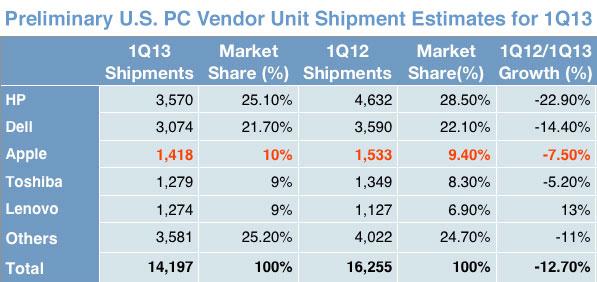As the PC market continues to shrink even after the heavily hyped launch of Microsoft's Windows 8, consolidation among hardware makers and an industry-wide shakeup is likely "inevitable" in the coming years, according to a new analysis.
The top five PC makers in the U.S. by market share last quarter, according to IDC.
Maynard Um with Wells Fargo believes the latest PC sales data from IDC, released this week, is the strongest indication yet that the PC market is in line for a major shakeup over the next few years. He sees an industry with more share consolidated among even fewer competitors.
The latest data from IDC showed that PC sales declined 13.9 percent year over year in the first quarter of 2013. That marks the worst year-over-year slip on record.
Apple saw its domestic sales slide 7.5 percent in the three-month span, according to IDC, suggesting that the Mac platform is in stronger shape than the overall PC market, though still also on the decline. However, IDC's data does not include international sales, which Um believes are likely growing faster than the U.S.
"While unit decline reflects Apple is not immune from the slowdown, it, unlike its peers, is at least participating in the tablet market," he said. "While new entrants offering low priced tablets are causing some share shifts, we believe Apple will continue to dominate dollar profit share — more than half of the industry profits despite 10 percent share."
Outside of Apple, Um expects to see a "markedly different" PC landscape in a few years, with fewer companies controlling larger shares. But in the interim, with no signs of immediate consolidation or industry rebound, Um believes the PC market will "continue to feel pain."
For the industry to reverse its downward trend, the analyst believes two major shifts need to happen. First, tablets will need to reach a level of market saturation, thus allowing consumer dollars to shift back to traditional PC purchases.
Secondly, Um believes pricing on PCs will need to become "materially more attractive" for the new touchscreen and ultrathin devices that debuted late last year along Microsoft's new Windows 8 operating system. At the moment, he believes these design shakeups are just too expensive for the average consumer.
The big winner in the March quarter, according to Um, was Dell, which gained 100 basis points of market share sequentially from the holiday quarter. He believes the company's gains may have been a result of its focus on retaining strategic share, which could have affected its pricing and margins.
The continued struggles seen in the PC market were predicted by late Apple co-founder Steve Jobs in 2010, when he said the debut of the iPad signaled the beginning of a market-wide transition to a post-PC era. At the time Jobs believed that traditional PCs would remain, but their presence would be diminished over time as fewer users would need their specific abilities.
"The transformation of the PC to new form factors like the tablet is going to make some people uneasy because the PC has taken us a long ways," Jobs said at the AllThingsD conference. "The PC is brilliant… and we like to talk about the post-PC era, but it's uncomfortable."
 Neil Hughes
Neil Hughes








-m.jpg)






 Charles Martin
Charles Martin
 Christine McKee
Christine McKee
 Wesley Hilliard
Wesley Hilliard
 Malcolm Owen
Malcolm Owen
 Andrew Orr
Andrew Orr
 William Gallagher
William Gallagher
 Sponsored Content
Sponsored Content







66 Comments
Of course, Apple will suffer for this, despite being the one to cause it all via the product that is singlehandedly killing Middle Modern computing.
Of course, Apple will suffer for this, despite being the one to cause it all via the product that is singlehandedly killing Middle Modern computing.
Along with reaping a big portion of the profits of both traditional PCs and tablets. Yet somehow, still d00med.
I think HP is done and will either be bankrupt or bought out by 2015. Toshiba and Lenovo are smart and small enough to continue on in some way.
PCs: "more than half of the industry profits despite 10 percent share" Phones: 3/4 of industry profits despite 20 percent share Tablets: virtually all industry profits despite 60 percent share The law of diminishing returns! Apple is doomed!! Must follow Samsung, HP and seek higher share, lower profits, or will be forced to follow the history of Blackberry and Nokia in falling from success at the hands of the next Apple!!! Sell, folks. Apple is success-toast. There's no way for it to outperform every industry it participates in greater than it already has, because no company like Apple has ever existed before, and therefore can't. New things simply don't happen. Expect Windows 9 to rapidly turn things around in 2015. And before that, two more releases of Android, including Lemon Lime Soda Flavored Sorbet, with PowerWidgets that flash glittering rainbows with infrared advertising.
[quote name="TheUnfetteredMind" url="/t/156923/consolidation-in-struggling-pc-market-considered-inevitable-as-sales-plummet#post_2308976"]Along with reaping a big portion of the profits of both traditional PCs and tablets. Yet somehow, still d00med. [/quote] I am starting to think these Wall Street types sit in front of a myriad of Dell Screens connected to Dells running analytical stock data checking their BBs now and then and assume they are typical users.